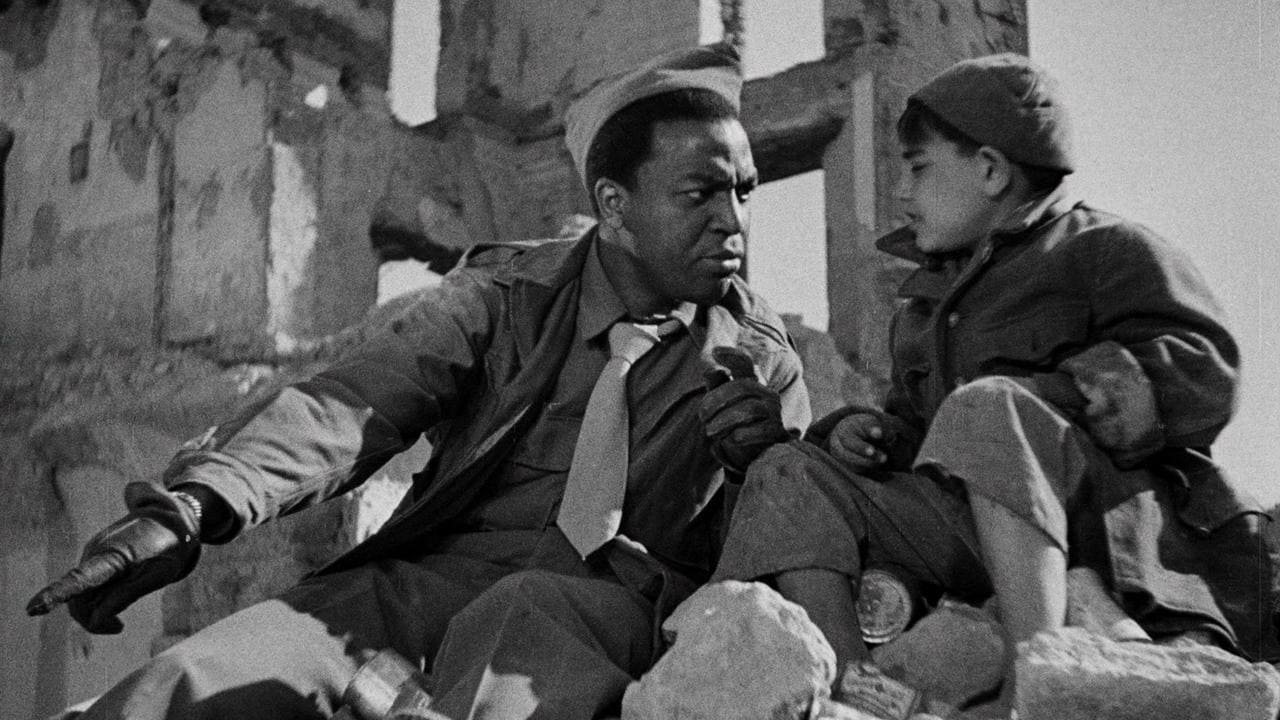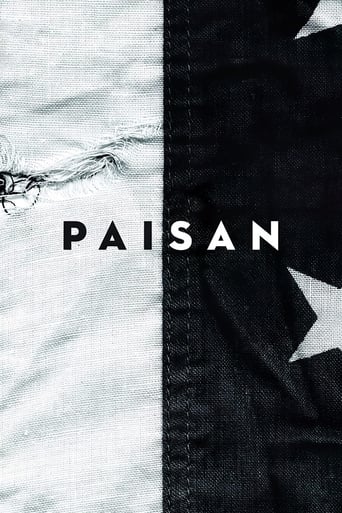

What makes it different from others?
... View MoreThat was an excellent one.
... View MoreFrom my favorite movies..
... View MoreA movie that not only functions as a solid scarefest but a razor-sharp satire.
... View MoreI found this Italian film in the book 1001 Movies You Must See Before You Die, I had no idea what to expect, but a few of the foreign language titles featured in the book have been worthwhile, I hoped this would be another, directed by Roberto Rossellini (Rome, Open City; Europe '51, Journey to Italy). Basically the film is told in six episodes, each focusing on six characters, including resistance workers, nurses and the Allied forces, from July 1943 to the winter of 1944, from Sicily to the north and Venice. These stories include Carmela (Carmela Sazio) guiding an American reconnaissance patrol through a German minefield, orphaned street urchin Pasquale (Alfonsino Pasca) who happens upon and steals the boots of bitter and drunk African-American soldier Joe (Dots Johnson), and drunken American soldier Fred (Gar Moore) finding prostitute Francesca (Maria Michi) who don't at first recognise each other. Also included are American nurse Harriet (Harriet Medin) and desperate partisan Massimo (Renzo Avanzo) risking their lives to get across the Arno river, three American chaplains: Catholic and Italian speaking Captain Bill Martin (William Tubbs), and his two colleagues are a Protestant and a Jew, and finally three members of the OSS (Office of Stratetgic Services) operating behind enemy lines to rescue two downed British airmen in the Po delta. I could tell whilst watching that the cast is made up of unprofessional actors, which accounts for awkwardness of dialogue and performances, it certainly adds to the realism of the documentary style of of filmmaking, but I will be honest and say that I lost track most of the time throughout anyway, and it's not the sort of thing I'd see again, but there were moments that got my attention, overall it is an alright neorealist war drama. It was nominated the Oscar for Best Writing, Story and Screenplay, and it was nominated the BAFTA for Best Film from any Source. Worth watching, at least once, in my opinion!
... View MoreIf there's one thing movies need, it's actors who can play the roles. Directors need people who are trained to perform their characters as best as the director visions them. Good actors get recognized and continue performing as well as they can. Yet, in the 1940s, Italian directors pioneered a certain form of filmmaking called "neorealism". This involved filming on location as opposed to a set and even had actual Italians performing the roles. Many of these had little to no experience acting, but the directors believed that their stories would be better told using actual Italians. Think of it as "for Italians, by Italians, starring Italians." One of the movies to incorporate this idea was Roberto Rossellini's post-WW II movie Paisan.A large number of people would think that something like putting actual Italians to tell this movie would be a pretty interesting idea, and it actually is. Rossellini took something that hadn't really been done before at the time. Many of his movies are pretty famous because of it, and the idea itself has been pretty influential. Paisan really is no exception. Instead of using Italian actors, Rossellini used actual Italians in different roles combined with American actors. It's a pretty ingenious idea in terms of filmmaking. Unfortunately, the movie feels a little dry. It's probably the realism of the movie or the stories that come across in the film.I say stories because the movie itself is actually a series of five vignettes as opposed to one full story. All of these have to deal with American soldiers in Italy after World War II. The first story deals with Americans in an Italian city who take one girl from the town to a seaside cliff. One of the soldiers tries to communicate with her but finds it hard because he doesn't know Italian. The second story is about a black American soldier who befriends a homeless boy that stole his boots. The third story has an American sleeping with an Italian prostitute musing about an Italian girl he used to love and tried to find again. He has no idea that the prostitute is the very girl. The fourth story has an American nurse meeting a painter who is a revolutionary leader named "Lupo". They struggle to get across the Ponte Vecchio and to safety. The last story is about American soldiers who are captured by the Nazis and executed before the war was over.The interesting thing about this movie is that because these are actual Italian people portraying Italian people, it appeared as if they were Italian people. The little boy wasn't trying too hard to play a poor Italian boy because well, he IS one. However, it's easy to tell that there is no experience with these people. The prostitute could have been done by an Italian actress, one who didn't really say her lines really monotonously. She realized who the guy she had was; she could be a little more shocked. The American actors were fine. Many of them felt like they actually were their characters as opposed to just acting them out. This makes it more interesting and even improves their acting. It's one thing to communicate with someone you know is faking it as well; it's another to communicate with someone who probably isn't. You have to be convincing enough to them, and that makes you convincing enough for the audience.The ideas of communication and friendship are very heavy in this movie. The Italians are speaking Italian, but many of the Americans don't understand and find it hard to connect with these people. Rossellini tries to emphasize that in the first story. The Americans in the other stories knew some Italian, but it was the ignorance of the other Italian characters that cost them. The soldier with the boy didn't realize that the boy was homeless from the war and became mad at the boy when he stole his boots. The soldier with the prostitute didn't trust her judgment, and the story doesn't end too well for the both of them. The same can be said about the fourth story. Connecting with the people around you is important in these stories, and it becomes even easier if you understand them.Unfortunately, this movie is a bit dry for me. When you try to make a story as real as humanly possible, you wind up making it so real that it feels like you're there. That works on numerous occasions such as mystery thrillers or suspenseful films, but these stories do come across as boring at times. The pacing of the movie has some part to play as the stories seem to go on and on. By the time something exciting or really dramatic happens, the scene is over. That may have been Rossellini's intent, but it doesn't help when there's nothing to keep us wanting to see these stories continue.Bottom line: Paisan is a potentially good showcase because it uses potentially interesting concepts. The realism in the acting and the set really make the movie convincing. The ideas about communication and connection really do come across in the stories, but the stories don't pace well and have very little dramatic worth. The filmmaking ideas are influential and have good intents, but it helps when the story itself is interesting. Not everyone is an aspiring filmmaker, but those who are can learn a lot from this movie.
... View MoreRosselini's epic which attempts to guide us through the lives of several people through the WWII era. In this drama, we see the corruptions and successes that come with war, and how some of the smaller stories that play into the grand epic of war are normally be quite tragic. Rosselini brushes over the aggregate picture of war, so that we may delve deeper into these individual stories as a way of portraying a more caustic reality. His goal seems to inspire emotion whether at be insipid or unjust, rather than simply focusing on the glory, and pageantry that goes into the process. In this way, we see how he was truly a pioneer of the neorealist genre. A genre that focus on trying to extract a truer story, so that the trials and tribulations of the average man may not be lost among the kistch-iness.. so that these people don't become simply memorials, but individuals that created it.Although this wasn't my effort movie in the war genre, I can certainly appreciate the aesthetic and narrative impression that Rossellini has made on film. While watching this movie, I began to see parallels to modern war epics, such as Saving Private Ryan, Windtalkers and Inglorious Basterds. The one see that sticks out to me is the scene inglorious Basterds where they are simply having fun ruthlessly murdering German soldiers. Of course, Tarantino provides a sort of fantasy world for this to take place in. The effort is still interesting and I believe pays homage to movies like this. I also found Rosselini's connection to Ingrid Bergman quite interesting. Although stylistically, they are not exactly alike, there are certain elements that can be seen in both films. I do not know whether they were together at the time of this movie, but that parallel is still unique.
... View MorePaisa, which is a greatly directed piece of work by Roberto Rossellini, this movie, is an interesting tell of a war movie, in this war movie however it shows six different films, all of which doing with a total different character and also dealing with a different part of the war. Each one of these stories has a true meaning to it, because a lot of this actually happens in the war, such as the little boy who is alone in Napoli, the woman who falls in love with the GI, but ends up turning into a not so nice woman. Also the story based in Florence based on true events that actually happen, the British officer that talks with the German troops that are destroying all in their way, the execution of the fascist sniper, and even that part where people are running down the Gallery of Uffizi. The last episode though was the most intense, and horrifying episode, because unlike the others that you felt were real, it wasn't until this episode that you could feel the fear that the people had of death, the smell horrifying images of deaths, and even the true brings out all the true feelings that many don't understand of what war is like or how it affects not only the person in the war, but everyone they know and care for. This movie was a great War movie, a must see. It has the feelings of war, the feelings of what it is like to come back from war and even brings in a little bit of romance to tie it all together.
... View More